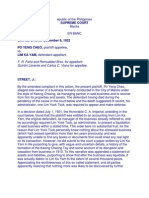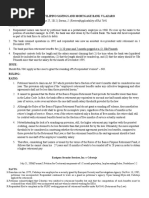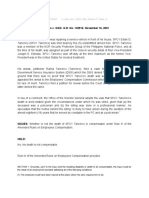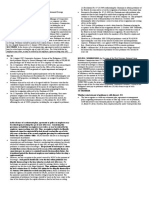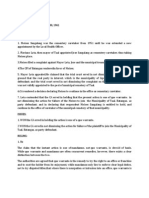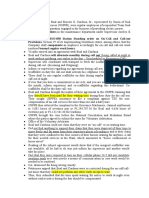San Miguel v. Democratic Labor
San Miguel v. Democratic Labor
Uploaded by
Gia DimayugaCopyright:
Available Formats
San Miguel v. Democratic Labor
San Miguel v. Democratic Labor
Uploaded by
Gia DimayugaOriginal Title
Copyright
Available Formats
Share this document
Did you find this document useful?
Is this content inappropriate?
Copyright:
Available Formats
San Miguel v. Democratic Labor
San Miguel v. Democratic Labor
Uploaded by
Gia DimayugaCopyright:
Available Formats
6. SAN MIGUEL v. DEMOCRATIC LABOR (Maye) b.
For employees who work at night, he held that they should be
July 31, 1963 | Bautista Angelo, J.| Eight-Hour Labor Law application paid their corresponding salary differentials for work done at night
w/ the present qualification: 25% of their salary for those who
PETITIONER: San Miguel Brewery Inc work at 6pm-12am and 75% for those who work from 12:01-6am.
RESPONDENT: Democratic Labor Organization c. For work done during Sundays and holidays, employees must be
paid an additional compensation of 25% even if they had been paid
SUMMARY: Respondent Democratic Labor Assoc. filed a manifestation a compensation on monthly salary basis.
claiming for the following against petitioner SMB: overtime pay, night-shift d. The demands for the application of the Minimum Wage Law to
differential pay, attorney’s fees, separation pay, and sick and vacation leave workers paid on “pakiao” basis, payment of accumulated vacation
compensation. Judge Bautista ruled that those working outside the company’s and sick leave and other claims were dismissed or set aside.
premises are entitled to overtime compensation, hence, the Eight-Hour Labor 5. SMC filed this petition for review questioning the ruling that outside or
Law applies to them. SMB filed this petition questioning Bautista’s ruling that field sales personnel are entitled to the benefits of the Eight-Hour Labor
outside or field sales personnel are entitled to the benefits of the Eight-Hour Law.
Labor law. 6. SMC alleged the following facts:
The issue is whether the Eight-Hour Labor Law applies to respondent workers. a. After the morning roll call, employees leave the plant to go on
SC held no. The Eight-Hour Labor Law only applies to an employee who is their respective sales route (7 am or 8 am). They do not have a
paid on a monthly or daily basis. This law has no application to employees paid daily time record as they were never required to start earlier.
on a piece-work basis. CIR is wrong to apply the law to the piece-work b. The sales routes were planned in a way that they can be completed
employees. According to a 1957 ruling by DOLE field sales personnel receiving within 8 hrs at most or within such number of hours.
regular monthly salaries, plus commission, are NOT subject to the Eight-Hour c. The moment these outside or field employees leave the plant and
Labor Law. while in their sales routes, they are on their own.
d. They receive monthly salaries and sales commissions, depending
DOCTRINE: upon their individual efforts or industry. Besides the monthly
The Eight-Hour Labor Law only applies to employees who are paid on a salary, they are paid sales commission ranging from P30-109 a
monthly or daily basis. Employees who are paid on a piece-work or commission month.
basis are EXCLUDED. 7. SMB contends that since employees concerned are paid a commission on
the sales they make outside of the required 8 hrs beside the fixed salary, the
FACTS: Court of Industrial Relations erred in ordering that they be paid an overtime
1. January 1955, Democratic Labor Association (“union”) filed a complaint compensation as required by the Eight-Hour Labor Law. The commission
against the San Miguel Brewery (SMB) embodying 12 demands for the they are paid already takes the place of such overtime compensation.
betterment of the conditions of employment of its members.
2. SMB filed its answer specifically denying its material averments. Asked for ISSUE: WoN the Eight Hour Labor Law is applicable to an employee or
the dismissal of the complaint. laborer who is paid on piece-work, “pakiao”, or commission basis? NO.
3. September 1955 – The union manifested its desire to confine its claim to its
demand for (1) overtime, (2) night-shift differential pay, (3) atty’s fees. RATIO:
a. It was also allowed to present evidence on service rendered during 1. Overtime compensation is an additional pay for work or services rendered
Sundays and holidays or its claim for additional separation pay and in excess of 8 hrs a day by an employee, and if the employee is already
sick and vacation leave. given extra compensation for excess labor, he is not covered by the law.
4. Judge Bautista, who received the evidence, rendered decision: 2. The Eight-Hour Labor Law only has application where an employee or
a. For overtime compensation, he held that the provisions of the laborer is paid on a monthly or daily basis, or is paid a monthly or
Eight-Hour Labor Law apply to the employees concerned for daily compensation. In such case, if he is made to work beyond the
those working in the field or engaged in the sale of the requisite period of 8 hours, he should be paid the additional compensation
company’s products outside its premises and consequently prescribed by law.
should be paid extra compensation in addition to the monthly 3. The law has no application when the employee or laborer is paid on a
salary and commission earned, regardless of meal allowance given. piece-work, “pakiao”, or commission basis, regardless of the time
employed.
a. Reason: His earnings in the form of commission is based on his public service.
gross receipts of the day. His participation depends upon his
industry so that more hours 🡪 higher commission. In addition, he is WHEREFORE, the decision of the industrial court is MODIFIED:
not subject to his employer’s personal supervision. ● The award with regard to extra work performed by those employed in the
4. In this case, the employees concerned are paid a fixed salary for their month outside or field sales force is set aside.
of service, and sometimes they work in excess of the 8-hour period. For ● The rest of decision (pay for Sundays and holidays and the award for night
their extra work, they are paid a COMMISSION, in lieu of the extra salary differentials) is AFFIRMED.
compensation to which they are entitled (See Fact 6d)
5. Insofar as the extra work they perform, the union can be considered as
employees paid on piece work, “pakiao” or commission basis. This is in
accord with the DOLE Opinion, when it made a ruling to the effect that
field sales personnel receiving regular monthly salaries, plus
commission, are NOT subject to the Eight-Hour Labor Law.
6. Therefore, the industrial court erred in holding that the Eight-Hour Labor
Law applies to the employees composing the outside service force.
Re: Claim for night salary differentials: See fact 4b for ruling.
a. Industrial court found that claimants worked with SMB and
rendered night duties once every 3 weeks during the period of
employment and they were never given any additional
compensation aside from their monthly salaries. Company started
paying night differentials only in 1949. As such, it ordered the
payment of night differentials retroactively (Fact 4b)
7. SMB argument: an award for night shift differentials cannot be given
retroactive effect, but can only be entertained from demand, which was
1953.
8. SC: It appears that before the filing of the petition concerning the claim for
night salary differentials, a similar one had already been filed long ago,
which had been the subject of negotiations between the union and the
company which culminated in a strike in 1952.
Re: Claim for pay for Sundays and holidays for service performed by some
who were watchmen and/or security guards.
a. SMB contends that these employees are not entitled to extra pay
for work done during these days because they are paid on a
monthly basis and are given one day off, which may take the place
of the work they may perform either on Sunday or any holiday.
9. SC: Disagree with this claim as it runs counter to law.
10. Commonwealth Act No. 444 expressly provides that no person, firm, or
corporation may compel an employee or laborer to work during Sundays
and legal holidays unless he is paid an additional sum of 25% of his regular
compensation.
a. General rule: This is MANDATORY, regardless of the nature of
compensation.
b. Exception: Not mandatory on public utilities who perform some
You might also like
- Labor Law in China - Progress and Challenges (PDFDrive)Document164 pagesLabor Law in China - Progress and Challenges (PDFDrive)Azzam Fotocopy PrintNo ratings yet
- Arco Metal Products Co., Inc., Et Al. vs. Samahan NG Mga Manggagawa Sa Arco Metal NAFLUDocument1 pageArco Metal Products Co., Inc., Et Al. vs. Samahan NG Mga Manggagawa Sa Arco Metal NAFLUAnn MarieNo ratings yet
- A.M. No. Mtj-16-1886-Benito, Li Carl T. (Vawc)Document2 pagesA.M. No. Mtj-16-1886-Benito, Li Carl T. (Vawc)licarl benitoNo ratings yet
- Case Digests: Topic AuthorDocument2 pagesCase Digests: Topic Authormichelle zatarainNo ratings yet
- #Cielo V NLRCDocument2 pages#Cielo V NLRCKareen Baucan100% (1)
- BEMI Vs NavalDocument2 pagesBEMI Vs NavalLDNo ratings yet
- Cartagenas Et Al Vs Romago ElectricDocument1 pageCartagenas Et Al Vs Romago ElectricChe Poblete Cardenas100% (1)
- Portillo v. Rudolph-Lietz Inc. G.R. 196539, Oct 10, 2012Document1 pagePortillo v. Rudolph-Lietz Inc. G.R. 196539, Oct 10, 2012homestudy buddyNo ratings yet
- Pacta Privata Juri Publico Derogare Non PossuntDocument1 pagePacta Privata Juri Publico Derogare Non PossuntRhea BarrogaNo ratings yet
- Hernandez Espejo v. NLRCDocument2 pagesHernandez Espejo v. NLRCKevin HernandezNo ratings yet
- Republic Planters Bank Vs NLRC, GR No. 117460 January 6, 1997Document4 pagesRepublic Planters Bank Vs NLRC, GR No. 117460 January 6, 1997AP CruzNo ratings yet
- 09 Po Yeng Cheo Vs Lim Ka YanDocument5 pages09 Po Yeng Cheo Vs Lim Ka YanDonnabelle CadagNo ratings yet
- Jarl v. AtencioDocument2 pagesJarl v. AtencioJennilyn TugelidaNo ratings yet
- Manila Terminal Co V CIRDocument2 pagesManila Terminal Co V CIRBetson CajayonNo ratings yet
- Holy Trinity Realty - Republic V CaguioaDocument4 pagesHoly Trinity Realty - Republic V Caguioaarianna0624No ratings yet
- 19.people of The Philippines vs. Daud GR 197539Document1 page19.people of The Philippines vs. Daud GR 197539Unicorns Are RealNo ratings yet
- Labor Digests For FinalsDocument37 pagesLabor Digests For FinalsdaryllNo ratings yet
- Status Maritime Versus Doctolero-Case DigestDocument1 pageStatus Maritime Versus Doctolero-Case DigestAnskee TejamNo ratings yet
- Litwin v. AllenDocument3 pagesLitwin v. AllenAnonymous 5MiN6I78I0No ratings yet
- Labor Digest 568b9d61ee9f7Document16 pagesLabor Digest 568b9d61ee9f7Jerwin Gorospe MariNo ratings yet
- G.R. No. 204555 - Parayday v. Shogun Shipping Co., IncDocument20 pagesG.R. No. 204555 - Parayday v. Shogun Shipping Co., IncMayumi RellitaNo ratings yet
- 03 BALO vs. CA (Tan)Document2 pages03 BALO vs. CA (Tan)Rudejane TanNo ratings yet
- People vs. BodozoDocument4 pagesPeople vs. BodozoMj BrionesNo ratings yet
- Coca Colavdel VillarDocument1 pageCoca Colavdel VillarBianca Nerizza A. Infantado IINo ratings yet
- Reyes Vs NLRCDocument4 pagesReyes Vs NLRCgeorgina616No ratings yet
- Petitioner Respondent: Second DivisionDocument5 pagesPetitioner Respondent: Second DivisionSeok Gyeong KangNo ratings yet
- #5 - Revidad vs. NLRCDocument1 page#5 - Revidad vs. NLRCKê MilanNo ratings yet
- 269 University of Pangasinan Vs FernandezDocument2 pages269 University of Pangasinan Vs FernandezIsay YasonNo ratings yet
- Amadeo Fishing Corporation v. NierraDocument2 pagesAmadeo Fishing Corporation v. NierraLinda David BetitoNo ratings yet
- Labor Relations Case Digest CompilationDocument2 pagesLabor Relations Case Digest Compilationxsar_xNo ratings yet
- Habana Vs NLRCDocument1 pageHabana Vs NLRCGale Charm SeñerezNo ratings yet
- Case 6 Labor Law G.R. No. 125903 Nov. 20 2000 People vs. Romulo Saulo Et - Al.Document1 pageCase 6 Labor Law G.R. No. 125903 Nov. 20 2000 People vs. Romulo Saulo Et - Al.Mae Clare Bendo100% (1)
- Ariola V PhilexDocument2 pagesAriola V PhilexJames Evan I. ObnamiaNo ratings yet
- Eparwa Security and Janitorial Services Vs Liceo de Cagayan UniversityDocument2 pagesEparwa Security and Janitorial Services Vs Liceo de Cagayan UniversityimangandaNo ratings yet
- Tancinco v. GSIS. G.R. No. 132916. November 16, 2001 FactsDocument2 pagesTancinco v. GSIS. G.R. No. 132916. November 16, 2001 FactsJoshuaMaulaNo ratings yet
- 04 PSTMSDWO v. PNCC Skyway Corp (Consing)Document1 page04 PSTMSDWO v. PNCC Skyway Corp (Consing)Mikhel BeltranNo ratings yet
- 33 BA Savings Bank V Sia, GR No. 131214, July 27, 2000Document4 pages33 BA Savings Bank V Sia, GR No. 131214, July 27, 2000Edgar Calzita AlotaNo ratings yet
- Montelibano V Bacolod-MurciaDocument1 pageMontelibano V Bacolod-MurciaJerico GodoyNo ratings yet
- Asia Pacific Christening Vs FarolanDocument2 pagesAsia Pacific Christening Vs FarolanRal CaldiNo ratings yet
- Sca Hygiene Products Corporation Employees AssociaDocument2 pagesSca Hygiene Products Corporation Employees AssociaLeslie LernerNo ratings yet
- Baron v. EPE TransportDocument1 pageBaron v. EPE TransportPerry LaoNo ratings yet
- Elenita Dewara V Spouses LamelaDocument2 pagesElenita Dewara V Spouses LamelaIkangApostolNo ratings yet
- Ramos Vs RamosDocument1 pageRamos Vs RamosAlexis Von TeNo ratings yet
- Republic V. Verzosa: Johan Constitutional Law 1Document2 pagesRepublic V. Verzosa: Johan Constitutional Law 1Gedan TanNo ratings yet
- PNCC Traffic v. PNCC, G.R. No. 171231, February 17, 2010Document1 pagePNCC Traffic v. PNCC, G.R. No. 171231, February 17, 2010Mary LeandaNo ratings yet
- 02 GR 198783Document4 pages02 GR 198783Mabelle ArellanoNo ratings yet
- Generoso Alano vs. EccDocument1 pageGeneroso Alano vs. EccKIERSTINE MARIE BARCELONo ratings yet
- Espejo v. NLRCDocument2 pagesEspejo v. NLRCYsabelleNo ratings yet
- Rule8 Case DigestDocument5 pagesRule8 Case DigestRafael BernardoNo ratings yet
- De Andres v. Diamond H Marine Services & Shipping Agency, Inc., G.R. No. 217345. July 12, 2017Document2 pagesDe Andres v. Diamond H Marine Services & Shipping Agency, Inc., G.R. No. 217345. July 12, 2017Pamela Camille Barredo100% (1)
- 02 Maraguinot V NLRCDocument2 pages02 Maraguinot V NLRCPlaneteer Prana100% (3)
- Digest-National Sugar Refineries Corp Vs NLRCDocument1 pageDigest-National Sugar Refineries Corp Vs NLRCida_chua8023No ratings yet
- Cagampan Vs NLRCDocument1 pageCagampan Vs NLRCShally Lao-unNo ratings yet
- Abante Vs KJGS Fleet ManagementDocument2 pagesAbante Vs KJGS Fleet ManagementTenet ManzanoNo ratings yet
- Limbona Vs COMELECDocument10 pagesLimbona Vs COMELECPMVNo ratings yet
- Sunace V NLRCDocument11 pagesSunace V NLRCReihannah Paguital-MagnoNo ratings yet
- Case Digest. Lota Vs CADocument2 pagesCase Digest. Lota Vs CAUsman EdresNo ratings yet
- De Ocampo vs. NLRC G.R. No. 101539 September 4, 1992 FactsDocument1 pageDe Ocampo vs. NLRC G.R. No. 101539 September 4, 1992 FactsMinorka Sushmita Pataunia SantoluisNo ratings yet
- W3.2. San Miguel Brewery V. Democratic Labor Union 8 SCRA 613Document4 pagesW3.2. San Miguel Brewery V. Democratic Labor Union 8 SCRA 613noemi alvarezNo ratings yet
- San Miguel Brewery Vs Democratic Labor UnionDocument2 pagesSan Miguel Brewery Vs Democratic Labor UnionWinnie Ann Daquil LomosadNo ratings yet
- San Miguel Brewery Inc. v. Democratic Labor Organization - No OT For Field PersonnelDocument5 pagesSan Miguel Brewery Inc. v. Democratic Labor Organization - No OT For Field PersonnelRency CorrigeNo ratings yet
- 38.san Miguel Brewery, Inc. vs. Democratic Labor OrgDocument2 pages38.san Miguel Brewery, Inc. vs. Democratic Labor OrgnathNo ratings yet
- Butte V Manuel Uy & Sons, Inc. (G.R. No. L-15499 Dated 18 February 1962)Document3 pagesButte V Manuel Uy & Sons, Inc. (G.R. No. L-15499 Dated 18 February 1962)Gia Dimayuga100% (1)
- Limjoco v. Intestate Estate of Pio Fragante (80 Phil 776 G.R. No. L-770 Dated April 27, 1948)Document9 pagesLimjoco v. Intestate Estate of Pio Fragante (80 Phil 776 G.R. No. L-770 Dated April 27, 1948)Gia DimayugaNo ratings yet
- Parish Priest of Roman Catholic Church of Victoria, Tarlac vs. Rigor (89 SCRA 493 G.R. No. L-22036 Dated April 30, 1979)Document7 pagesParish Priest of Roman Catholic Church of Victoria, Tarlac vs. Rigor (89 SCRA 493 G.R. No. L-22036 Dated April 30, 1979)Gia DimayugaNo ratings yet
- Gloria v. Builders Savings and Loan Association (G.R. 202324, June 4, 2018) 832 Phil. 64Document1 pageGloria v. Builders Savings and Loan Association (G.R. 202324, June 4, 2018) 832 Phil. 64Gia DimayugaNo ratings yet
- Heirs of Soliva V Cenon (G.R. No. 159611 Dated April 22, 2015)Document9 pagesHeirs of Soliva V Cenon (G.R. No. 159611 Dated April 22, 2015)Gia Dimayuga0% (1)
- National Housing Authority vs. Almeida (525 SCRA 383 G.R. No. 162784 Dated 22 June 2007)Document4 pagesNational Housing Authority vs. Almeida (525 SCRA 383 G.R. No. 162784 Dated 22 June 2007)Gia DimayugaNo ratings yet
- Pago Allegedly Executed by Respondent Benjamin Bayhon in Favor of PetitionerDocument4 pagesPago Allegedly Executed by Respondent Benjamin Bayhon in Favor of PetitionerGia DimayugaNo ratings yet
- (Case 63) Treyes Vs Larlar (G.R. 232579, September 8, 2020) Caguioa, J.Document23 pages(Case 63) Treyes Vs Larlar (G.R. 232579, September 8, 2020) Caguioa, J.Gia DimayugaNo ratings yet
- Natividad vs. Natividad (G.R. No. 198434 Dated February 29, 2016)Document6 pagesNatividad vs. Natividad (G.R. No. 198434 Dated February 29, 2016)Gia DimayugaNo ratings yet
- Cruz vs. Cruz (G.R. No. 173292 Dated 1 September 2010)Document5 pagesCruz vs. Cruz (G.R. No. 173292 Dated 1 September 2010)Gia DimayugaNo ratings yet
- Balus vs. Balus, Et Al. (610 SCRA 178 G.R. No. 168970, January 15, 2010)Document3 pagesBalus vs. Balus, Et Al. (610 SCRA 178 G.R. No. 168970, January 15, 2010)Gia DimayugaNo ratings yet
- Rodriguez vs. Borja (17 SCRA 418 G.R. No. L-21993 Dated June 21, 1966)Document5 pagesRodriguez vs. Borja (17 SCRA 418 G.R. No. L-21993 Dated June 21, 1966)Gia DimayugaNo ratings yet
- Estate of K.H. Hemady vs. Luzon Surety (100 Phil. 389 G.R. No. L-8437 Dated November 28, 1956)Document7 pagesEstate of K.H. Hemady vs. Luzon Surety (100 Phil. 389 G.R. No. L-8437 Dated November 28, 1956)Gia DimayugaNo ratings yet
- Lapuz vs. Eufemio (43 SCRA 177 G.R. No. L-30977 Dated January 31, 1972)Document6 pagesLapuz vs. Eufemio (43 SCRA 177 G.R. No. L-30977 Dated January 31, 1972)Gia Dimayuga100% (1)
- Asserted That Lagrama Was An Independent Contractor As He Was Paid in Piece-Work Basis. Issue Is WON Lagrama Is An Independent Contractor or AnDocument2 pagesAsserted That Lagrama Was An Independent Contractor As He Was Paid in Piece-Work Basis. Issue Is WON Lagrama Is An Independent Contractor or AnGia DimayugaNo ratings yet
- Bonilla vs. Barcena (71 SCRA 491 G.R. No. L-41715 Dated June 18, 1976)Document3 pagesBonilla vs. Barcena (71 SCRA 491 G.R. No. L-41715 Dated June 18, 1976)Gia DimayugaNo ratings yet
- Alvarez vs. IAC (185 SCRA 8 G.R. No. L-68053 Dated May 7, 1990)Document6 pagesAlvarez vs. IAC (185 SCRA 8 G.R. No. L-68053 Dated May 7, 1990)Gia DimayugaNo ratings yet
- Uson v. Del RosarioDocument3 pagesUson v. Del RosarioMartinCroffsonNo ratings yet
- Union of Sual Power Plant Employees vs. Team SualDocument3 pagesUnion of Sual Power Plant Employees vs. Team SualGia DimayugaNo ratings yet
- Serrano v. Severino Santos TransitDocument3 pagesSerrano v. Severino Santos TransitGia DimayugaNo ratings yet
- National Sugar Refineries v. NLRCDocument4 pagesNational Sugar Refineries v. NLRCGia DimayugaNo ratings yet
- Union Bank vs. Santibanez (452 SCRA 228 G.R. No. 149926 Dated February 23, 2005)Document7 pagesUnion Bank vs. Santibanez (452 SCRA 228 G.R. No. 149926 Dated February 23, 2005)Gia DimayugaNo ratings yet
- 4 Labor Working ConditionsDocument109 pages4 Labor Working ConditionsGia DimayugaNo ratings yet
- Spouses Salitico v. Heirs of Felix (G.R. 240199, 10 April 2019)Document5 pagesSpouses Salitico v. Heirs of Felix (G.R. 240199, 10 April 2019)Gia DimayugaNo ratings yet
- Apex Mining Company, Inc. v. NLRCDocument3 pagesApex Mining Company, Inc. v. NLRCGia DimayugaNo ratings yet
- Peñarada v. BanagaDocument3 pagesPeñarada v. BanagaGia DimayugaNo ratings yet
- Third Division (G.R. No. 209078, September 04, 2019)Document21 pagesThird Division (G.R. No. 209078, September 04, 2019)Gia DimayugaNo ratings yet
- David vs. MacasioDocument4 pagesDavid vs. MacasioGia DimayugaNo ratings yet
- Romeo T. Caluzor v. Deogracias Llanillo, (G.R. No. 155580, 1 July 2015)Document2 pagesRomeo T. Caluzor v. Deogracias Llanillo, (G.R. No. 155580, 1 July 2015)Gia Dimayuga100% (1)
- Five Catholic Saints To Help StudentsDocument2 pagesFive Catholic Saints To Help StudentsGia DimayugaNo ratings yet
- Syllabus of (Integrated) Degree Course 2024-25Document83 pagesSyllabus of (Integrated) Degree Course 2024-25mohd.zaidmail1No ratings yet
- International Crimes Provided by The Rome Statute of The International Criminal CourtDocument9 pagesInternational Crimes Provided by The Rome Statute of The International Criminal CourtPraygod ManaseNo ratings yet
- Evolution of Conveyancing in KenyaDocument2 pagesEvolution of Conveyancing in KenyaRayoh SijiNo ratings yet
- Position Paper Paluga & GamaloDocument19 pagesPosition Paper Paluga & GamaloJoseph SereñoNo ratings yet
- Review Materials I (20230225193838)Document11 pagesReview Materials I (20230225193838)Fake AccountNo ratings yet
- PO No. 296 (HILTI INDIA PVT LTD)Document1 pagePO No. 296 (HILTI INDIA PVT LTD)sayantan deep kantaNo ratings yet
- Zacarias C. Cristobal EstafaDocument2 pagesZacarias C. Cristobal EstafaWendell MaunahanNo ratings yet
- Lawsuit: Courthouse News Service v. Texas Office of Court Administration, Et Al.Document115 pagesLawsuit: Courthouse News Service v. Texas Office of Court Administration, Et Al.KBTXNo ratings yet
- Undue Delay and Imposition of Timeline As SolutionDocument24 pagesUndue Delay and Imposition of Timeline As SolutionMahesh ChidambaramNo ratings yet
- Ilusorio vs. Ilusorio - BildnerDocument5 pagesIlusorio vs. Ilusorio - BildnerRomy IanNo ratings yet
- Property Law Including Transfer of Property Act and EasementDocument1 pageProperty Law Including Transfer of Property Act and Easementsalunkeakshay649No ratings yet
- Polirev Lecture NotesDocument3 pagesPolirev Lecture NotesTeacherEliNo ratings yet
- MCC591 of 2016Document14 pagesMCC591 of 2016yash sahuNo ratings yet
- Itp Kelas 8 Raport Widya Wiyata Sem 1Document1 pageItp Kelas 8 Raport Widya Wiyata Sem 1Fakhrotun Nisa' S.si., S.pdNo ratings yet
- Random tdDocument5 pagesRandom tdDarshit VyasNo ratings yet
- Form Business Risk AssessmentDocument2 pagesForm Business Risk Assessmentmaulana yusufNo ratings yet
- Saudi Arabian Airlines v. CA - Case Digest: FactsDocument24 pagesSaudi Arabian Airlines v. CA - Case Digest: FactsMondrich GabrienteNo ratings yet
- By Chance or ProvidenceDocument10 pagesBy Chance or ProvidenceNicolas MarquesNo ratings yet
- SESSION NO. 3 and 4 (Week 2) : Cities of Mandaluyong and PasigDocument3 pagesSESSION NO. 3 and 4 (Week 2) : Cities of Mandaluyong and Pasig123ilseoNo ratings yet
- Crim 1 - RN - Articles 1 - 10Document5 pagesCrim 1 - RN - Articles 1 - 10Helvert AdsuaraNo ratings yet
- History Research Paper ChaitanyaDocument17 pagesHistory Research Paper ChaitanyaChaitanya SapkalNo ratings yet
- 308-2023 FirDocument4 pages308-2023 FirRANGA TULASINo ratings yet
- 01 25 13 Product Substitution Procedures PDFDocument2 pages01 25 13 Product Substitution Procedures PDFShahid AkramNo ratings yet
- Instant Download Legal Research Analysis and Writing 2nd Ed Edition Putman PDF All ChapterDocument84 pagesInstant Download Legal Research Analysis and Writing 2nd Ed Edition Putman PDF All Chapteralcodyda100% (7)
- Brymor HotelsDocument24 pagesBrymor HotelsADEMILUYI SAMUEL TOLULOPENo ratings yet
- Negotiable Instruments Law Sec. 30 - 37Document12 pagesNegotiable Instruments Law Sec. 30 - 37Michael Vincent AlaganoNo ratings yet
- Ohrc 2Document6 pagesOhrc 2iamrupesh.naik2No ratings yet
- Armafix Pe Block - en - v2Document4 pagesArmafix Pe Block - en - v2Berbagi NewsNo ratings yet











